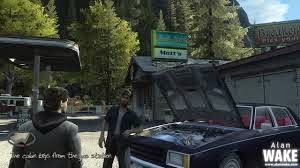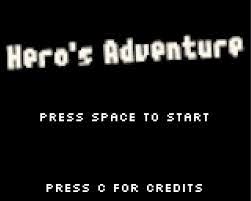Let's talk about TV...
You would have the occasional series that pushed beyond this, but it wasn't until an award winning movie director named David Lynch created the groundbreaking TV series Twin Peaks that TV really started to hint at what it could be, and what so many shows today aspire to be. These shows with their long form continuing stories offer a single piece of entertainment that lasts potentially dozens of hours and allows the audience to really experience the world of the story in a way that a movie's short glimpse simply can't offer. You know what other form of media does this? That's right, video games. But while most games try to emulate the feel of a movie, a company called Remedy Entertainment realized that emulating the feel of a TV drama series makes much more sense. And with that idea, they created Alan Wake.
As with Remedy's earlier hit series Max Payne, story telling is an integral part of the experience of playing Alan Wake. It tells the story of Alan, a successful horror writer (sort of a Stephen King type), who has been suffering from writer's block for a couple of years and is afraid that his career might be over. In an attempt to get his mind off of it, Alan and his wife Alice take a vacation to the sleepy little town of Bright Falls Washington. Bright falls is a place full of secrets, colorful characters, mysterious paranormal phenomena, and a diner that serves some damn good coffee.
At this point, every Twin Peaks fan reading this is eye rolling, but it really does come across as much more of a loving tribute than a blatant rip off. I constantly got the feeling that this is what it might feel like if David Lynch and Stephen King teamed up to reinvent Twin Peaks for a new audience, and on a new medium.
The change of media isn't even as big of a change as one might imagine, as Alan Wake is constantly pulling TV drama tropes to give it the feel that you are inside the world of a TV Show. Each level is presented as an episode, beginning with "Previously on Alan Wake" and ending with an edge of your seat cliffhanger and a slow fade as a random song plays in its entirety.
And while many games would use the latest overplayed pop single, or some up and coming act the label is paying to promote, or maybe just some unknown band who's music could be licensed cheaply, Alan Wake instead uses perfectly fitting classic songs from artists such as Roy Orbison, David Bowie, Depeche Mode, and even Nick Cave and the Bad Seeds. Seriously, how often do you get to hear Nick Cave in a video game? (If you don't know who that is, open a new browser tab and google it, you can finish reading this review when you're done.)
The music plays a role in game as well. Throughout your adventure you'll often find radios to turn on, letting you listen to the local talk radio show to get an idea of what's going on in the town around you. These radio shows often play music as well, including music by the game's fictional band Old Gods of Asgard, a heavy metal band from the 70s whose two surviving members have a farm just outside of Bright Falls. Their songs provide clues to the town's past, and at one point have you in an epic battle on a full blown heavy metal stage in the middle of nowhere using the stage lights and pyrotechnics to battle monsters.
I should probably mention these monsters while we're at it. While the presentation of Alan Wake as a story driven dramatic interactive TV show certainly all holds true, at its foundation Alan Wake is still an action game. Most of this action is in the form of running from, or doing battle with shadow monsters. Because these creatures draw their energy from the darkness, light is used to fight them. While you'll generally have some sort of rifle or pistol on you, bullets won't hurt these monsters until they've first been weakened by light. For this reason, you'll also have a flashlight on you most of the time, which is every bit as useful in combat as a shotgun.
This mechanic allows from some imaginative yet intuitive gameplay. Since the game is presented from a 3rd person perspective, the beam of your flashlight shows where you are aiming, and eliminates the need for any sort of cumbersome aiming reticule heads up display. Also, flare guns and flash grenades become devastating weapons against your enemy, which prevents the designers from having to shoehorn rocket launchers or grenades into the story in order to let you better arm yourself. Mounted spotlights take the place of turrets and street lamps provide small areas of safe haven. One thing to keep in mind is that this game often removes your collected equipment for plot reasons between missions, so don't be afraid to use that powerful weapon you find, saving it for later will often just waste it.
It's not all shadow monsters though, sometimes the environment itself comes to life and turns against you. There are several points where using your flashlight or other light sources against flying inanimate objects is the only way to venture forward. It's also not a rare thing to be attacked by a flock of birds, feeling like a cross between Alfred Hitchcock and the Rakk sequences from Borderlands. Alan Wake sometimes provides puzzle elements as you try to connect power sources and start generators in order to illuminate your foes. A couple sections even provide some platforming challenges that work surprisingly well given the game's lack of focus on jumping. Even the driving in the game feels good as the occasional car or truck you get to take for a spin offer tight and satisfying controls.
On top of all of this, the main draw of Alan Wake is still the story. It's hard to talk about the story without giving away elements that are much more enjoyable to discover for yourself, but the story has a lot going on that will keep you wanting to play just a bit more, and keep you thinking about the game when not playing it. Elements such as the pages of the novel you find scattered throughout the levels would be simple collection side challenges in some games, but in Alan Wake it is an integral part of the story and sometimes provides valuable information about challenges that lie ahead.
Visually, the game looks amazing. The environments are highly detailed and realistic. The characters each have a distinct and recognizable look without looking stylized or cartoony. The entire town feels like a real town where people actually live, and after playing through the game you'll feel as if you've really been there. It's not perfect however, the lip syncing never really lines up right, and the occasional full motion video sequences on TVs in the game feel out of place and mostly make the game world feel less realistic, but these few flaws generally feel insignificant compared to all that it does so right.
There's a lot to like about Alan Wake, and I could probably keep going on about it far longer than anybody would care to read, but I'll try to wrap this up. It's been a few months since I played a game that I really enjoyed this much. I'm glad that I play such a wide variety of games, but playing this one reminds me of why I enjoy gaming so much in the first place. So, hopefully Remedy will continue to expand on this series and not cancel it before its time as was the case with the show it pulls so much inspiration from.
The change of media isn't even as big of a change as one might imagine, as Alan Wake is constantly pulling TV drama tropes to give it the feel that you are inside the world of a TV Show. Each level is presented as an episode, beginning with "Previously on Alan Wake" and ending with an edge of your seat cliffhanger and a slow fade as a random song plays in its entirety.
This mechanic allows from some imaginative yet intuitive gameplay. Since the game is presented from a 3rd person perspective, the beam of your flashlight shows where you are aiming, and eliminates the need for any sort of cumbersome aiming reticule heads up display. Also, flare guns and flash grenades become devastating weapons against your enemy, which prevents the designers from having to shoehorn rocket launchers or grenades into the story in order to let you better arm yourself. Mounted spotlights take the place of turrets and street lamps provide small areas of safe haven. One thing to keep in mind is that this game often removes your collected equipment for plot reasons between missions, so don't be afraid to use that powerful weapon you find, saving it for later will often just waste it.
It's not all shadow monsters though, sometimes the environment itself comes to life and turns against you. There are several points where using your flashlight or other light sources against flying inanimate objects is the only way to venture forward. It's also not a rare thing to be attacked by a flock of birds, feeling like a cross between Alfred Hitchcock and the Rakk sequences from Borderlands. Alan Wake sometimes provides puzzle elements as you try to connect power sources and start generators in order to illuminate your foes. A couple sections even provide some platforming challenges that work surprisingly well given the game's lack of focus on jumping. Even the driving in the game feels good as the occasional car or truck you get to take for a spin offer tight and satisfying controls.
There's a lot to like about Alan Wake, and I could probably keep going on about it far longer than anybody would care to read, but I'll try to wrap this up. It's been a few months since I played a game that I really enjoyed this much. I'm glad that I play such a wide variety of games, but playing this one reminds me of why I enjoy gaming so much in the first place. So, hopefully Remedy will continue to expand on this series and not cancel it before its time as was the case with the show it pulls so much inspiration from.

















.jpeg)


.jpeg)










